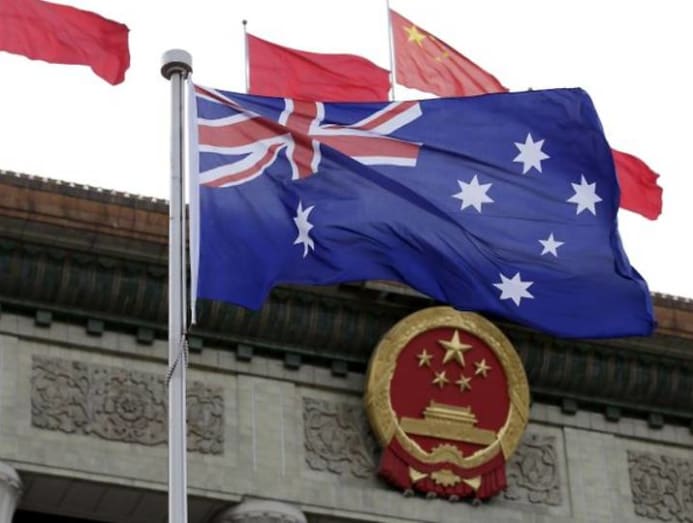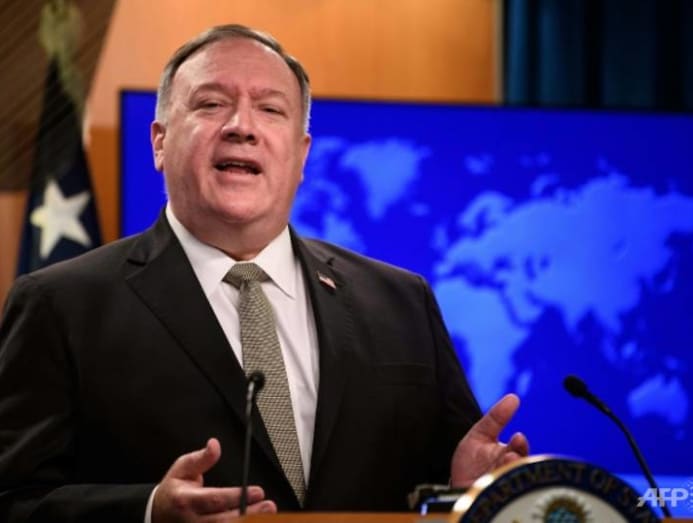Commentary: China’s tantrums at Australia can be self-defeating
SYDNEY: When Canberra called for an international, independent inquiry into COVID-19 in April, Beijing deployed trade restrictions measures against Australian beefiness and barley the side by side month.
And so when the Australian government responded firmly to Prc imposing a sweeping national security law in Hong Kong at the cease of June, the Australian Fiscal Review's Andrew Tillett and Mike Smith wrote that "the regime [was] privately bracing for a trade backlash as punishment".
Sure plenty, what followed was an anti-dumping investigation into Australian wine, another meat processor having its certification to supply the Chinese market suspended, and barley exports from a major Perth-based grain visitor barred on nutrient safety grounds.
READ: Commentary: Why China is turning sour on Commonwealth of australia wines
READ: Commentary: Can China produce grape wine as fine equally the French?
A BREWING Trade State of war?
Trade minister Simon Birmingham says that "Australia is certainly non engaging in any type of trade state of war [with Cathay]". The Perth US-Asia Centre's Jeff Wilson concurred to the extent it was more a one-way "trade bashing".
Even so Weihuan Zhou of the University of New S Wales also observes: "Australia itself has been one of the near frequent users of anti-dumping measures, peculiarly confronting China".
And after watching Treasurer Josh Frydenberg cake the auction of a dairy and drinks manufacturer from a Japanese owner to a Chinese one last month – despite the deal having the approval of the Foreign Investment Review Board and the Australian Competition and Consumer Commission – the Australian National Academy's Jane Golley assessed: "Nosotros're on the verge of a merchandise and investment war – if we're non already in one".
But Trade IS GROWING
While today'southward state of affairs is dire, there are still a few information points that suggest not all is lost.
The background is a deteriorating political relationship since at least 2017. Yet despite that, ii-way trade has continued to abound.

In 2017, Australia'southward exports to Red china were worth US$116 billion, accounting for 30 per cent of the total. By 2019, they had reached U.s.a.$169.1 billion, a 34.3 per cent share.
And while the headlines this year have gravitated to instances increasingly appearing as Chinese trade punishment, in the first seven months of 2020, the total value of Commonwealth of australia's goods exports to Cathay is steady on the same menstruum a twelvemonth before. This is during a period in which much of the global economy has been in deep recession.
And while the headlines this year have gravitated to instances increasingly appearing as Chinese trade punishment, in the first vii months of 2020, the total value of Australia's goods exports to China is steady on the same flow a year before.
This is during a period in which much of the global economy has been in deep recession.
READ: Commentary: Oil prepare for a long and rocky road to recovery
LISTEN: Recovery, restructuring and mayhap rebound? The outlook for the Singapore economy
A farther twenty or so are also able to sell the frozen product, which accounts for around 85 per cent of all Australian beefiness exports to China by volume.
The barley story is dissimilar because prohibitive tariffs wiped out the merchandise.
But these measures followed an 18-calendar month Chinese anti-dumping investigation that gave Australian grain growers the opportunity to switch to other crops and seek out culling markets. Many did precisely that.
SOME RESTRAINT NEEDED Fifty-fifty WHILE THROWING A TANTRUM
Of course, Red china is non exercising restraint out of benevolence. Trade is, by definition, a win-win exchange.
So stopping trade means China loses too. Beijing could delist all Australian meat processors. But where would Chinese consumers become their high-quality meat poly peptide from then?

Nor are Australian producers always without marketplace power. In recent months, China has slipped to beingness Australia'due south fourth-largest beef market, with the United states of america, Japan and Korea leapfrogging it to consume the residue.
Perhaps Beijing'south calculations are even more uncomplicated: Deep down it knows merchandise tantrums won't work, so what'due south the betoken in trying as well hard?
The fact is that resisting aggressive Chinese moves is a domestic political winner for the Scott Morrison government, and nowadays even the voices of groups with interests in urging moderation in Australian government policies, such as the concern sector, have grown quieter.
READ: Commentary: People's republic of china is preparing for more heated relations with US
READ: Commentary: Zoom diplomacy has limits in Asia
Red china'S ACTIONS HURTS ITS REPUTATION
China'due south actions to engagement are likewise beingness beamed around the world, casting significant global dubiety on its reputation as a reliable trading partner that plays by the rules.
In July, The states Secretary of State Mike Pompeo took pleasance in declaring that "the Usa commends the Morrison government for continuing up for democratic values and the rule of law, despite intense, continued, coercive force per unit area from the Chinese Communist Political party to bow to Beijing's wishes".

None of this to suggest that Australia can afford to be complacent or arrogant. The costs of merchandise disruptions imposed by China are real, peculiarly on private Australian companies and specific regions, even if they are not equally large as usually imagined.
"Own goals" ought to be avoided. There is a difference betwixt making considered statements that defend Australian interests and megaphone diplomacy.
Last week, former foreign affairs government minister Julie Bishop said, "In my feel, it is possible to have robust private discussions with Chinese officials well-nigh all aspects of the relationship … They react badly when such discussions are in the public domain, particularly if such matters were not kickoff raised in confidence."
The ability to de-escalate remains inside the capacity of both Canberra and Beijing, and in one case again allows Australia and Chinese companies and households get on with the engagement that both sides concord is of mutual do good.
James Laurenceson is Director and Professor at the Australia-China Relations Plant (UTS), University of Technology Sydney. This commentary starting time appeared in Lowy Institute's web log The Interpreter.
Source: https://cnalifestyle.channelnewsasia.com/commentary/commentary-chinas-tantrums-australia-can-be-self-defeating-295851
0 Response to "Commentary: China’s tantrums at Australia can be self-defeating"
Postar um comentário